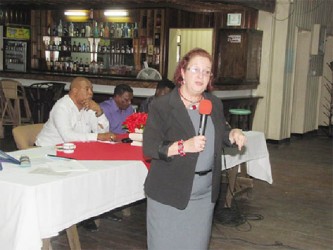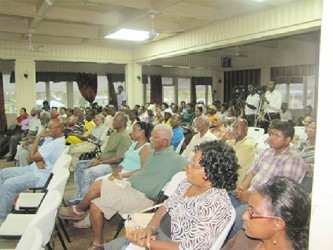The United States refused offers by the Government of Guyana to obtain a building to set up a Drug Enforcement Agency (DEA) office here in 2005, presidential advisor Gail Teixeira told Lindeners on Wednesday.
She was at the time responding to a question at a town hall meeting at the Watooka Guest House, which was organised to update Linden and Region Ten residents on the Anti-Money Laundering and Countering of Financing of Terrorism (Amendment) Bill and challenges the government faces in passing the bill through the National Assembly and the fallout if this is not done in a timely manner.
During the interactive session of the meeting, Lawrence Talbot, one of the more than one hundred people at the meeting, said that the issues surrounding the bill originated with narco-trafficking in Guyana sometime back and the DEA made a representation in 2004 to the Guyana government to set up an office in Guyana but that did not occur.

Teixeira said that she was the Minister of Home Affairs at the time and that she personally took the DEA agent to four properties in Guyana that the government was offering to use as the headquarters for the DEA in Guyana in 2005. However, she added that the US said it did not want those properties and it was not going to put in the G$10M or $20M to secure them for the purposes of the DEA and that was the end of the matter.
“I’m talking from my personal experience,” she stressed. “I personally took the man with (Head of the Presidential Secretariat) Dr. (Roger) Luncheon to see four properties in Guyana– four–that in our view, from our security people … were properly located for the purposes of the DEA and they turned down each of the properties,” she said.
“We then said, ‘You identify any property you think would be best–government or private–and we’ll talk.’ From 2005 to now, they’ve never come with any other property. So, please don’t go change the story and done the story,” she added.
Talbot, a trained accountant, who had lived for a considerable period in Canada before he retired and returned to Guyana, said that he was not going to change the story and he apologised for making the government’s chief whip angry. She replied that she was not angry.
In a January 6, 2006 diplomatic cable, which has since been made public by WikLeaks, then US Ambassador Roland Bullen had noted that the US government held discussions with the Government of Guyana (GoG) off and on since 1999 about setting up a DEA presence in Guyana. He said several issues had prevented the establishment of a DEA presence here. “The current stumbling block is the GoG’s inability or reluctance to give approval for basic logistical details,” he explained. Bullen added that while the US government was ready to work with and advise the GoG “as soon as the GoG is fully prepared to move forward in its fight against narco-trafficking.”

Later that same year, Bullen made a case for the establishment of a DEA office here, warning that the influence of narco-trafficking was creating conditions for the emergence of a narco-state.
“The level of narco-trafficking influence on the political, judicial and economic systems in Guyana creates ripe conditions for the emergence of a narco-state,” he warned.
The next year, US Embassy Charge d’ Affaires Michael Thomas, in an August 29, 2007 cable, requested that a US$100,000 allotment for the creation of the vetted unit be reallocated for a drug demand reduction project. He noted that no funds from the allocation had been used, since government’s positions had scuttled the initiative. “The vetted unit project is no longer viable due to the Government of Guyana’s failure to identify an acceptable location for the unit and their lack of progress in addressing drug trafficking issues,” Thomas said.
‘Tightening supervisory authority’
Talbot went on to state that the Bank of Guyana is this country’s Central Bank, which has the responsibility of overseeing financial institutions in the country but he has never seen a report from the Central Bank on money laundering or where any banking institution has broken any law although it is known that there are Guyanese who traffic in narcotics and the proceeds of that crime have to be washed in Guyana or some other place.
He then asked about Guyana’s extradition treaty, stating that he is concerned that no one has ever been extradited from this country for narcotics or money laundering. Junior Finance Minister Juan Edghill, who chaired the meeting, said the premise of Talbot’s arguments is a reason to support the amendment bill. “…Because this bill is about tightening supervisory authority. This bill gives the power for a supervisor from the Bank of Guyana to enter into any bank during working hours to inspect and to ask questions of the persons there concerning any suspicious transaction that is taking place. That is what this bill is giving. So, contrary to what you are saying, this bill is to prevent the weaknesses that existed before from continuing and this is what we are putting to the Parliament to ensure that it gets declared,” he said.
Explaining that extradition works in two parts, Teixeira said Guyana can ask for someone to be extradited to Guyana after that person has committed a crime, or another country can ask Guyana to extradite a person to that country.
“The extradition requests to Guyana, thus far, from the United States, are mainly to do with Guyanese abroad, who have engaged in murder, rape, robbery under arms, (and) attempted murder, who have escaped from the United States and have come back here and if they can be found, there is a judicial process … through the court of Guyana. The court has to agree,” she noted.
“And remember there was a case a few years ago of a drug person and there was an extradition request and Guyana complied with its law and the international convention by taking the man to court and the judiciary said we could not do it that way; we were to come back to Parliament and amend our law further to fill that gap, which was used by the defence lawyer in that case to stop that extradition,” she pointed out.
Teixeira contrasted the situation with the arrest of drug kingpin Roger Khan. “Let’s take Roger Khan. Roger Khan was captured, I think, in Suriname. He was supposed to return to Guyana. En route to Guyana, he was removed to the United States. That is a violation of all the extradition treaties,” she said, while noting that such rendition is against all international human rights conventions.
“Roger Khan was intercepted in the Trinidad airport, put on a plane to the United States and charged. The government has asked the Americans from time to time, ‘please share with us the information you have because if it is for illegal drug activity then countries are supposed to share with each other,’” Teixeira noted.
The government had been severely criticized for not taking action against Khan over a number of years even though it was clear that he was deeply involved in drug trafficking and laundering. Khan was also heavily involved in fighting suspected criminals during that period and later made this claim in a daily newspaper in his bid to stave off attempts by local police to arrest him.
The advisor to the President said that reciprocity is an important aspect of the money laundering bill of all countries and as long as Guyana is found to be non-compliant, the country will face problems with reciprocity.
She said when the Guyana government tried to track money in the early days on the old Prevention of Money Laundering Act, the government was able to follow the money up to a certain point in Miami and when the bank in Guyana tried to get information from banks in Miami, it was told that the United States has privacy laws and the bank could not divulge the requested information.
She said some of the money laundered in Guyana stays in the country while some is transferred to other countries. She said some of the biggest drug lords such as Pablo Escobar that have been apprehended and jailed have not been found with large quantities of drugs. They were indicted through the paper trail, which sometimes took over five years to follow the money from Colombia to Mexico to the United States then back to Mexico and Colombia. “So, this is not a rapid response issue. This is not your cowboy and Indian playing. This is a real world of accountants … auditors … finance specialists and IT specialists … backroom people. They are not going out there with gun and socket. If you see the collaboration. Money laundering is a different thing from fighting narcotics. They are linked but they are a different process,” she noted.




